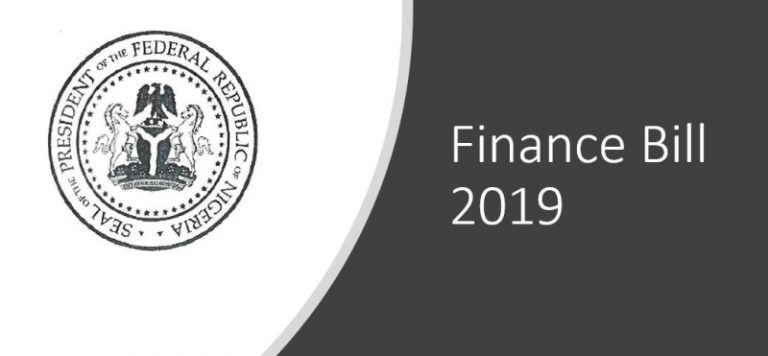Newly Signed Finance Bill: How it affects you and your business
President Muhammadu Buhari, on Monday, signed the Finance Bill into law after several months’ passage by the legislature.
With the signing into law, the bill is expected to set the tone for Nigeria’s fiscal policy for 2020, by reviewing several archaic tax laws that have hurt businesses and investment in the country.
We note five implications the bill will have on the economy, businesses as well as individuals
1) VAT now 7.5%
With the passage of the new finance bill into law, the amount paid as Value Added taxes (VAT), would be 7.5 per cent.
That’s an increase of 50 per cent from the 5 per cent initially paid as VAT before the bill was signed into law.
The need for the increase came amid concerns of dwindling revenues that has made the government handicapped and unable to fulfil a fiscal obligation.
Proceeds from the taxes would also enable the government to pay the new minimum wage of N30000, which was increased by 67 per cent, following agitations by trade unions on the need to raise the least amount paid to the country’s least workers.
To lessen the burden of the tax increase on small businesses, the bill stipulates only businesses that have an annual turnover of N25 million and above, will be required to register for VAT, charge and collect VAT on its sales.
It also exempts several basic items including such as bread, cereal (raw or semi-processed), cooking oil, culinary herbs (if raw and unprocessed), fish (other than ornamental), flour and starch (refined or unrefined), fruits (including dried), milk (including powdered), nuts and pulses (including roasted, fried, boiled, salted), roots (also in the form of flakes), salt (excluding industrial), vegetables (dried or ground), and water (excluding sparkling or flavoured), which are known to be mainly consumed by the poor, from being affected by the VAT increase.
Similarly, the services provided by Microfinance Banks, and tuition paid for nursery, primary and secondary education is VAT exempt.
Despite the exemptions to cater for the over 90 million citizens living below $1.90 a day, the increase would still be borne by the masses in the form of higher price, according to several analysts who spoke to BusinessDay.
According to them, unlike in many other countries, VAT in Nigeria is incurred on fixed assets and services cannot be claimed as a credit against
VAT collected from sales making the implications is that the VAT increases to result in higher-cost production and investment, which will be passed on to the consumers.
“The current “VAT” system in Nigeria is closer to a cascading Sales tax structure, and unfairly increases the cost of doing business along with each level of the value chain,” said analysts at global consulting firm PricewaterhouseCoopers.
“While the 7.5 percent VAT rate is low compared with the rate in other countries, these countries have a proper VAT system that avoids these challenges. Any further increase in the VAT rate without addressing this issue may be detrimental to the economy,” PWC said.
There are also concerns that the new tax increase might not translate into the needed revenue for the government since it would be major to fund the new minimum wage which was increased last year from N18, 000 to N30, 000, pre-empting analysts to say term the increase as “robbing Peter to pay Paul”.
2) TIN more compulsory than ever
With the signing into law of the Finance Bill, commercial banks are mandated to request for Tax Identification Number (TIN) before opening business bank accounts for individuals, while existing account holders must provide their TIN to continue operating their accounts.
Analysts say the move will help in closing the loopholes of tax leakages from individuals and businesses who deliberately evade taxes.
“While this is the practice, the proposed amendment is a welcome development, as it would give a legal basis to the practice of tax collection,” analysts at Deloitte said in a note. “It would also help in helping the government generate more from non-tax revenues.
3) Relief for companies on tax multiplicity
The finance bill woukd serve as a relief for companies that complained of paying taxes at various levels.
The law modifies commencement and cessation rules for companies in order to eliminate overlaps and gaps to avoid double taxation and complication during commencement
The effect of these rules is that companies suffer tax twice on profits of at least 12 months when they commence business. Conversely, on cessation of business, a period of up to 12 months escapes tax.
Analysts say the removal of these rules is a welcome development as it would help in solving the issue of multiplicity of taxes which has hitherto hurt investment.
4) Excess dividend tax to apply only to untaxed distributions other than profits
Currently, companies are charged to tax at 30 per cent on their dividend distributions where such dividends exceed the taxable profits for the year notwithstanding that profits being distributed may have been taxed in prior years, exempt from tax, or taxed under different tax law.
This particularly affects holding companies on dividends received from their subsidiaries thereby making Nigeria unattractive as a headquarters or group holding company location.
With the finance bill signed into law, it the application of the tax only to untaxed profits that are not exempt from tax. Also, a lower rate of 20 per cent tax would now apply to medium-sized companies with a turnover between N25 million and N100 million
5) Life and non-life businesses would no longer be liable to a special minimum tax provision
With the finance bill signed into law, Insurance companies can now carry forward tax losses indefinitely, deduct reserve for unexpired risks on time apportionment bases while special minimum tax for insurance has been abolished
Call 0803 239 3958 for free financial consulting advice for your businesses.
Send your accounting articles to blog@skytrendconsulting.com.
READ ALSO!
Scammers hack UBA server, cart away N752m
Businesses With Less Than N25m Turnover Are Now VAT Exempt
Scammers hack UBA server, cart away N752m
How to get quick loans from Gtbank, Zenith, UBA, Access Bank without collateral
Access Bank non-collateralized emergency loan hits N1bn daily: How you can benefit…
VAT threshold of N25m: All you need to know
PAYE: How to calculate personal income tax
Skytrend Consulting: Financial services and accounting solutions company
VAT on online purchases: 8 Critical things you must know
READ ALSO! TraderMoni: Poverty Alleviation Or Political Leverage?
Are you a lover of soft drinks and canned fruit juices? You may soon be paying a special tax to be imposed by the FG. What are its implications for you and for your business? Click the link below to read more:
New soft drink tax: Its implication for you and your business







